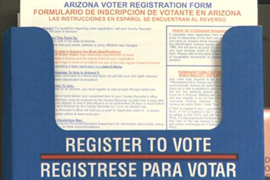Arizona’s voter registration law heads for Supreme Court review

For the complete Voting Rights in America project, visit http://votingrights.news21.com.
Arizona’s Proposition 200 instructs elections officials to reject voter registration forms that do not include one of the following as proof of U.S. citizenship:
• Driver’s license or nonoperating ID license
• Copy of a birth certificate
• Copy of a passport
• Naturalization documents
• Other documents cited in the Immigration Reform and Control Act of 1986
• Bureau of Indian Affairs or tribal treaty card number, or tribal enrollment number
WASHINGTON – To Arizona Attorney General Tom Horne, the state law requiring proof of citizenship for voter registration is “common sense,” not a burden.
To opponents, Arizona’s Proposition 200 is just another obstacle that would restrict access to the polls for the young, elderly and minorities.
The U.S. Supreme Court will weigh in this month in a hearing that will be watched closely by voting rights advocates and by several other states with similar laws.
At issue in the March 18 hearing is a decision by the 9th U.S. Circuit Court of Appeals, which said federal law trumped state law on voter registration requirements. The appeals court said in April that voters could use a federal mail-in registration form, established by the 1993 National Voter Registration Act, which only requires that they attest to their citizenship through a signature.
Arizona’s law, approved by voters in 2004, requires some proof of citizenship – a passport, birth certificate, driver’s license, tribal or other documents – before a person can register. The appeals court said the state can still require proof for the state form, but could not keep someone from registering by using the federal form.
Horne said the state law is necessary, pointing to a district court finding that 200 non-citizens had registered to vote in 2005.
“Everybody I’ve talked to feels like if you’re going to register to vote you should provide evidence you are a citizen,” Horne said.
But a national survey of voter fraud cases last year by News21, a reporting project run by a coalition of universities, turned up only seven confirmed cases of voter fraud in Arizona from 2000 through 2011.
Sam Wercinski, the executive director for Arizona Advocacy Network, said that when Proposition 200 passed, many ads alluded to undocumented immigrants trying to hijack the political process. The shortage of known voter fraud cases shows the weakness of that argument, he said.
Wercinski said the law would only lead to disenfranchising Native Americans, Latinos, young and elderly voters and was written “so those currently in political power can maintain power.”
Latinos are hardest-hit by the law because they have the largest percentage of new voters, Wercinski said.
He said many young people may not have a driver’s license, because that could mean higher insurance premiums for their families. When presented with the opportunity to register, those prospective new voters are not carrying the other forms of qualifying identification spelled out in the law, he said.
“Nobody is walking around, generally, with their passport or birth certificate,” Wercinski said.
Joe Sparks, a lawyer for the Inter Tribal Council of Arizona, also believes the law was deliberately designed to disenfranchise voters. The council is one of the lead parties in the Supreme Court case challenging the law.
Sparks said the law “seems reasonable if you just read it and don’t know the circumstances on the reservation.” But he said there are hundreds of Native American voters in Arizona who do not have driver’s licenses, passports, birth certificates or other documentation listed.
While Proposition 200 does list citizenship documents specific to Native Americans, he said, some of those documents do not exist for all tribes or only exist for specific tribes. That is one of the complaints cited in the council’s suit against the law.
The Supreme Court’s ruling in the case could affect a number of other states that have passed or are considering similar laws. Alabama, Georgia, Kansas, Michigan, Georgia, Oklahoma and Kansas filed a brief in favor of Arizona, arguing that it should be a state’s right to regulate voter registration.
While Horne was reluctant to predict what the court might do, Sparks said he is optimistic about the case. Sparks said the purpose of National Voter Registration Act was to make it easier for citizens to vote and that the act does not leave room for states to add requirements like those in Proposition 200.
“Federal law is in our favor,” Sparks said.















